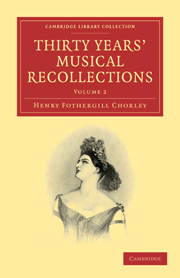Book contents
- Frontmatter
- Contents
- THE YEAR 1847
- THE YEAR 1848 (Her Majesty's Theatre.)
- THE YEAR 1848 (Royal Italian Opera.)
- THE YEAR 1849 (Her Majesty's Theatre.)
- THE YEAR 1849 (Royal Italian Opera.)
- THE YEAR 1850 (Her Majesty's Theatre.)
- THE YEAR 1850 (Royal Italian Opera.)
- THE YEAR 1851 (Her Majesty's Theatre.)
- THE YEAR 1851 (Royal Italian Opera.)
- THE YEAR 1852 (Her Majesty's Theatre.)
- THE YEAR 1852 (Royal Italian Opera.)
- THE YEAR 1853 (Royal Italian Opera.)
- THE YEAR 1854 (Royal Italian Opera)
- THE YEAR 1855 (Royal Italian Opera.)
- THE YEAR 1856 (Her Majesty's Theatre.)
- THE YEAR 1856 (Royal Italian Opera.)
- THE YEAR 1857 (Royal Italian Opera.)
- THE YEAR 1857 (Her Majesty's Theatre.)
- THE YEAR 1858 (Her Majesty's Theatre.—Royal Italian Opera.—Drury Lane.)
- THE YEAR 1859 (Royal Italian Opera.—Drury Lane.)
- The Last Chapter
THE YEAR 1850 (Royal Italian Opera.)
Published online by Cambridge University Press: 29 August 2010
- Frontmatter
- Contents
- THE YEAR 1847
- THE YEAR 1848 (Her Majesty's Theatre.)
- THE YEAR 1848 (Royal Italian Opera.)
- THE YEAR 1849 (Her Majesty's Theatre.)
- THE YEAR 1849 (Royal Italian Opera.)
- THE YEAR 1850 (Her Majesty's Theatre.)
- THE YEAR 1850 (Royal Italian Opera.)
- THE YEAR 1851 (Her Majesty's Theatre.)
- THE YEAR 1851 (Royal Italian Opera.)
- THE YEAR 1852 (Her Majesty's Theatre.)
- THE YEAR 1852 (Royal Italian Opera.)
- THE YEAR 1853 (Royal Italian Opera.)
- THE YEAR 1854 (Royal Italian Opera)
- THE YEAR 1855 (Royal Italian Opera.)
- THE YEAR 1856 (Her Majesty's Theatre.)
- THE YEAR 1856 (Royal Italian Opera.)
- THE YEAR 1857 (Royal Italian Opera.)
- THE YEAR 1857 (Her Majesty's Theatre.)
- THE YEAR 1858 (Her Majesty's Theatre.—Royal Italian Opera.—Drury Lane.)
- THE YEAR 1859 (Royal Italian Opera.—Drury Lane.)
- The Last Chapter
Summary
This was a season of splendid performances, memorable for many things. Year by year, the taste for grand Opera spread and increased in England. Year by year, the execution became finer and finer.
“Der Freischütz” in its Italian dress, and with recitatives excellently adjusted by Signor Costa, was relished by others more than by myself. German music and Southern words do not agree; nor has the experiment of translation ever succeeded, whether the work be one of Spohr's,—or “Fidelio,”—or this most German of German operas, a goblin tale. The terrors of the Wolf's Glen lose half their terror, when “done into Italian.” Neither is recitative introduced in place of spoken dialogue often happy. A certain lightness and proportion are sacrificed, without any compensation in the form of solidity or grandeur being added. I have found this in M. Auber's “Fra Diavolo”—in M. Meyerbeer's “L'Etoile:”—in every other work thus stiffened—but in no case so heavily as in the case of the ultra- German popular legend. A like essay was made at Paris, with the incomprehensible recitatives of M. Berlioz;—but there, the result was virtually the same as here.—At Covent Garden, however, “II Franco Arciero” enjoyed one advantage, in not being sung by Italian artists, Mdlle. Vera excepted.—The tenor, Signor Maralti, was Belgian.—The Caspar of Herr Formes has been always one of his favourite characters—the type of all he could do best in Opera, and with less left undone than in other parts.
- Type
- Chapter
- Information
- Thirty Years' Musical Recollections , pp. 120 - 131Publisher: Cambridge University PressPrint publication year: 2009First published in: 1862



